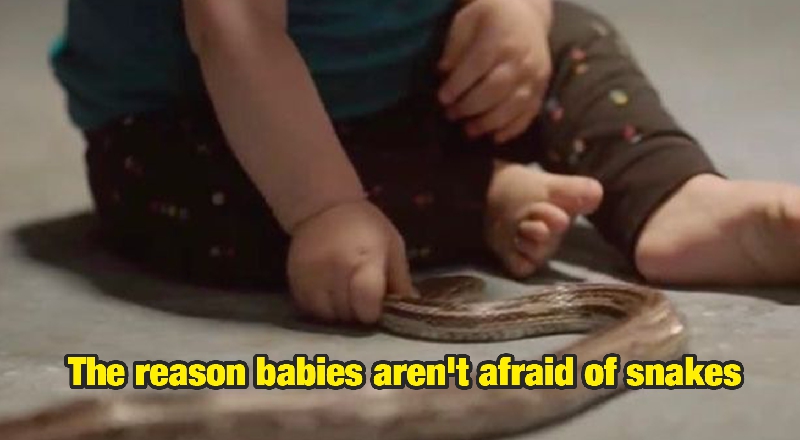This is the reason why it doesn’t really work when you show babies videos of snakes and try to scare them
Viral: The reason babies aren’t afraid of snakes has been revealed – and it’s adorable
It’s one of the most common and intense fears in the world, and could reduce Indiana Jones to a quivering mess.
So why aren’t babies scared of snakes ?
There has long been a belief that most people are innately scared of snakes, because they are deadly, and because so many people fear them.
But a study conducted in 2015 throws that into question, as a group of 11-month-old babies watched snakes without batting an eyelid or shedding a tear.
BBC Earth reports that a team of researchers used something called a startle probe to test the children’s reactions.
In the study, children were shown videos of snakes with happy or fearful voices (Image: BBC)
As they watched videos of snakes and elephants, coupled with happy voices and fearful voices, a flash of light was shone to see how scared they were.
The more scared they were, the bigger the response would be.
But the report said: “Results suggest that snakes capture infants’ attention; infants showed the fastest startle responses and lowest average heart rate to the snakes, especially when paired with a fearful voice.
“Unexpectedly, they also showed significantly reduced startle magnitude during this same snake video plus fearful voice combination.”
The study brings new evidence into the conversation about fear (Image: BBC)
Some say we are only born with two fears, and all others are learned (Image: BBC)
So it seems they were not already scared of the slippery creatures before the probe went off.
Psychology Today explains that fear is a vital part of the way humans protect themselves from danger. Bad experiences can trigger new fears.
There is evidence that humans are born with two fears, of heights and of loud noises, and that most others are formed within six years.
- Chart Below Reveals Recommended Bed Times By Age.
- New Study By ‘Growing Up In Australia’ Reveals Mental Health Effects
- Here’s When To Put Your Kids to Bed Based On Their Wake-Up Tim
- National Institutes of Health suggests that children who go to bed earlier also sleep longer.
When I was pregnant with my first child, a friend’s dad told me “congratulations, you’ll never sleep again.” I laughed, and naively thought that my kid would be different.
Two kids later and sleep ranks up there with potty training as one of the toughest aspects of parenting. Nobody seems to get enough, and the struggle is daily.
Early To Bed Is Best For Everyone Involved
But a new study confirms why all those bedtime battles are indeed worth it. When kids go to bed early, they are healthier and mom is happier.
This may seem like common sense, but science has confirmed its truth with the Growing Up in Australia study, during which researchers tracked thousands of families beginning in 2004. Every two years, these families took part in a series of interviews that allowed researchers to check in on the state of their physical and mental health.
Analyzing the sleep and lifestyle data they collected, researchers found that children with early bedtimes—those asleep by 8:30 p.m.—had “better health-related quality of life.” And their moms had improved mental health, too.
Jon Quach, the lead author of the study, spoke to Today about the findings. “So mums and dads, getting kids to bed early is not just great for them. It’s good for you, too,” he said.
Makes sense to me.
There’s nothing quite as sweet as the silence that falls on my house shortly after 8 p.m. That evening quiet time is a gift. A space in the day to recharge, relax and watch “The Bachelor” in peace.
Having kids is a mental and physical feat. When you add the mental load of jobs, marriage, home maintenance and some semblance of self-care to the list, it’s no wonder parents have some excess stress and fatigue in their lives.
Kids Who Go To Bed Earlier Tend To Sleep Longer
In addition to happy mommies, there are some real benefits to children as well. A U.S. poll featured on the National Institutes of Health website suggests that children who go to bed earlier also sleep longer.
And kids need a lot of sleep…
Just look at this chart from the National Sleep Foundation, which shows the recommended number of hours of sleep kids should get each night:
And here’s another handy chart I’ve used that outlines when to put your kids to bed based on their wake-up time:
Also, you can check out this handy sleep calendar that Web-Blinds put together below!
The Sleep Calculator for Kids is brought to you by Web-Blinds. To give your child a better chance of sleeping right through the night, choose from a range of blackout blinds, which help stop the dawn sun from lighting up your kid’s bedroom and disturbing them in the early morning
What’s your opinion? Let us know in the comments!
